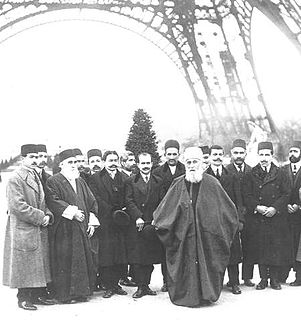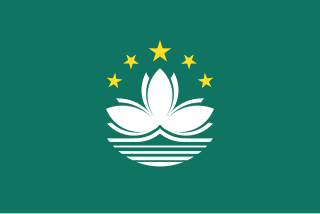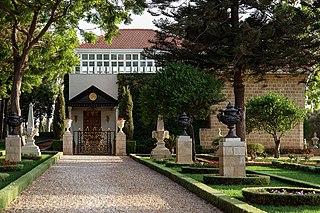
Religion in Macau is represented predominantly by Chinese folk religions and Buddhism. During the period in which the city was under Portuguese rule (1557–1999) the Catholic Church became one of the dominant faiths, but nowadays it has greatly declined.
The introduction of the Bahá'í Faith in Vietnam first occurred in the 1920s, not long after French Indochina was mentioned by `Abdu'l-Bahá as a potential destination for Bahá'í teachers. After a number of brief visits from travelling teachers throughout the first half of the 20th century, the first Bahá'i group in Vietnam was established in Saigon in 1954, with the arrival of Shirin Fozdar, a Bahá'í teacher from India. The 1950s and 1960s were marked by periods of rapid growth, mainly in South Vietnam; despite the ongoing war affecting the country, the Bahá'í population surged to around 200,000 adherents by 1975. After the end of the war, Vietnam was reunified under a communist government, who proscribed the practice of the religion from 1975 to 1992, leading to a sharp drop in community numbers. Relations with the government gradually improved, however, and in 2007 the Bahá'í Faith was officially registered, followed by its full legal recognition a year later. As of 2012, it was reported that the Bahá'í community comprised about 8,000 followers.
The Bahá'í Faith in Kazakhstan began during the policy of oppression of religion in the former Soviet Union. Before that time, Kazakhstan, as part of the Russian Empire, had indirect contact with the Bahá'í Faith as far back as 1847. Following the arrival of pioneers the community grew to be the largest religious community after Islam and Christianity, although only a minor percent of the national whole. By 1994 the National Spiritual Assembly of Kazakhstan was elected and the community had begun to multiply its efforts across various interests. The Association of Religion Data Archives estimated some 6,400 Bahá'ís in 2005.
The Bahá'í Faith in Turkmenistan begins before Russian advances into the region when the area was under the influence of Persia. By 1887 a community of Bahá'í refugees from religious violence in Persia had made a religious center in Ashgabat. Shortly afterwards — by 1894 — Russia made Turkmenistan part of the Russian Empire. While the Bahá'í Faith spread across the Russian Empire and attracted the attention of scholars and artists, the Bahá'í community in Ashgabat built the first Bahá'í House of Worship, elected one of the first Bahá'í local administrative institutions and was a center of scholarship. During the Soviet period religious persecution made the Bahá'í community almost disappear — however, Bahá'ís who moved into the regions in the 1950s did identify individuals still adhering to the religion. Following the dissolution of the Soviet Union in late 1991, Bahá'í communities and their administrative bodies started to develop across the nations of the former Soviet Union; In 1994 Turkmenistan elected its own National Spiritual Assembly however, laws passed in 1995 in Turkmenistan required 500 adult religious adherents in each locality for registration and no Bahá'í community in Turkmenistan could meet this requirement. As of 2007 the religion had still failed to reach the minimum number of adherents to register and individuals have had their homes raided for Bahá'í literature.
The Bahá'í Faith in the Philippines is a community of Filipinos, who like their fellow Bahá'ís living in other parts of the world, view the world's major religions as a part of a single, progressive process through which God reveals His will to humanity. They recognize Baha'u'llah, the founder of the Baha'i Faith, as the most recent in a line of Divine Messengers that includes Abraham, Moses, Buddha, Zoroaster, Christ and Muhammad. It is composed of Filipinos from various ethnic and religious background. The religion first reached the country in 1921 with a Bahá'í first visiting the Philippines that year. By 1944 the first Bahá'í Local Spiritual Assembly in the country was established in Solano, Nueva Vizcaya. In the early 1960s, during a period of accelerated growth, the community grew from 200 in 1960 to 1000 by 1962 and 2000 by 1963. In 1964 the National Spiritual Assembly of the Bahá'ís of the Philippines was elected and by 1980 there were 64000 Bahá'ís and 45 local assemblies. The Bahá'ís have been active in multi/inter-faith developments. The Association of Religion Data Archives estimates the Bahá'í population of the Philippines at about 272600.
The Bahá'í Faith in Taiwan began after the religion entered areas of China and nearby Japan. The first Bahá'ís arrived in Taiwan in 1949 and the first of these to have become a Bahá'í was Jerome Chu in 1945 while visiting the United States. By May 1955 there were eighteen Bahá'ís in six localities across Taiwan. The first Local Spiritual Assembly in Taiwan was elected in Tainan in 1956. The National Spiritual Assembly was first elected in 1967 when there were local assemblies in Taipei, Tainan, Hualien, and Pingtung. Circa 2006 the Bahá'ís showed up in the national census with 16,000 members and 13 assemblies.

The Bahá'í Faith in Scotland is a minority religion. According to the 2001 Census in Scotland, roughly four hundred people living there declared themselves to be Bahá'ís, compared to a 2004 figure of approximately 5,000 Bahá'ís in the United Kingdom.
The Bahá'í Faith in Laos begins after a brief mention by `Abdu'l-Bahá in 1916 and the first Bahá'í enters Laos in about 1955. The first Bahá'í Local Spiritual Assembly is known to be first elected by 1958 in Vientiane and eventually Laos' own National Spiritual Assembly is first elected in 1967. The current community is approximately eight thousand adherents and four centers: Vientiane, Vientiane Province, Kaysone Phomvihane, Pakxe and smaller populations in other provinces. While well established and able to function as communities in these cities, Bahá'ís have a harder time in other provinces and cannot print their own religious materials. The Association of Religion Data Archives estimated almost 14000 Bahá'ís in 2005.
The Bahá'í Faith in Japan begins after a few mentions of the country by `Abdu'l-Bahá first in 1875. Japanese contact with the religion came from the West when Kanichi Yamamoto (山本寛一) was living in Honolulu, Hawaii in 1902 converted; the second being Saichiro Fujita (藤田左弌郎).
The Bahá'í Faith is a diverse and widespread religion founded by Bahá'u'lláh in the 19th century in Iran. Bahá'í sources usually estimate the worldwide Bahá'í population to be above 5 million. Most encyclopedias and similar sources estimate between 5 and 6 million Bahá'ís in the world in the early 21st century.
The Bahá'í Faith in Pakistan begins previous to its independence when it was part of India. The roots of the Bahá'í Faith in the region go back to the first days of the Bábí religion in 1844, with Shaykh Sa'id Hindi who was from Multan. During Bahá'u'lláh's lifetime, as founder of the religion, he encouraged some of his followers to move to the area that is current-day Pakistan.
The Bahá'í Faith in Uzbekistan began in the lifetime of Bahá'u'lláh, the founder of the religion. Circa 1918 there were an estimated 1900 Bahá'ís in Tashkent. By the period of the policy of oppression of religion in the former Soviet Union the communities shrank away - by 1963 in the entire USSR there were about 200 Bahá'ís. Little is known until the 1980s when the Bahá'í Faith started to grow across the Soviet Union again. In 1991 a Bahá'í National Spiritual Assembly of the Soviet Union was elected but was quickly split among its former members. In 1992, a regional National Spiritual Assembly for the whole of Central Asia was formed with its seat in Ashgabat. In 1994 the National Spiritual Assembly of Uzbekistan was elected. In 2008 eight Bahá'í Local Spiritual Assemblies or smaller groups had registered with the government though more recently there were also raids and expulsions.
The Bahá'í Faith in Portugal comes after the first mention of Portugal in Bahá'í literature when `Abdu'l-Bahá mentioned it as a place to take the religion to in 1916. The first Bahá'í visitor to Portugal was in 1926. Its first Bahá'í Local Spiritual Assembly was elected in Lisbon in 1946. In 1962 the Portuguese Bahá'ís elected their first National Spiritual Assembly. In 1963 there were nine assemblies. According to recent counts there are close to some 2000 members of the Bahá'í Faith in 2005 according to the Association of Religion Data Archives.
The Bahá'í Faith in Hong Kong began during the lifetime of the founder of the Bahá'í Faith, Bahá'u'lláh.
The Bahá'í Faith was first introduced in China during the lifetime of its founder, Bahá'u'lláh (1817–1892).
The Bahá'í Faith is a diverse and widespread religion founded by Bahá'u'lláh in the 19th century in Iran. Bahá'í sources usually estimate the worldwide Bahá'í population to be above 5 million. Most encyclopedias and similar sources estimate between 5 and 6 million Bahá'ís in the world in the early 21st century. The religion is almost entirely contained in a single, organized, hierarchical community, but the Bahá'í population is spread out into almost every country and ethnicity in the world, being recognized as the second-most geographically widespread religion after Christianity. See Bahá'í statistics.
The Bahá'í Faith is a diverse and widespread religion founded by Bahá'u'lláh in the 19th century in Iran. Bahá'í sources usually estimate the worldwide Bahá'í population to be above 5 million. Most encyclopedias and similar sources estimate between 5 and 6 million Bahá'ís in the world in the early 21st century. The religion is almost entirely contained in a single, organized, hierarchical community, but the Bahá'í population is spread out into almost every country and ethnicity in the world, being recognized as the second-most geographically widespread religion after Christianity. See Bahá'í statistics.

The Bahá'í Faith is a diverse and widespread religion founded by Bahá'u'lláh in the 19th century in Iran. Bahá'í sources usually estimate the worldwide Bahá'í population to be above 5 million. Most encyclopedias and similar sources estimate between 5 and 6 million Bahá'ís in the world in the early 21st century. The religion is almost entirely contained in a single, organized, hierarchical community, but the Bahá'í population is spread out into almost every country and ethnicity in the world, being recognized as the second-most geographically widespread religion after Christianity. See Bahá'í statistics.
The Bahá'í Faith in Algeria began about 1952. In 1954 the first Bahá'í Local Spiritual Assembly of Algiers was elected. In 1963 a survey of the community counted 2 assemblies, 2 organized groups of Bahá'ís and hosted a regional National Spiritual Assembly for Algeria and Tunisia in 1967 however pioneers were expelled in late 1968 during the period of the independence of Algeria when the country adopted Islamic practices in rejection of colonial influences. However more recently the Association of Religion Data Archives and Wolfram Alpha estimated 3.3–3.8 thousand Bahá'ís in 2005 and 2010.
The Bahá'í Faith in Tunisia begins circa 1910 when the first Bahá'í arrives, possibly from Egypt. In 1956 at Ridván, a marked holy day of the religion and a day on which major elections are held, three new Regional Spiritual Assemblies were established including that of North-West Africa with the chairmanship of Enoch Olinga In 1963 a survey of the community counted 1 assembly and 18 organized groups of Bahá'ís in Tunisia. US State Department 2001 estimates mention the Bahá'í community at about 150 persons. However Association of Religion Data Archives and several other sources point to over 1000 Bahá'ís in the country.









